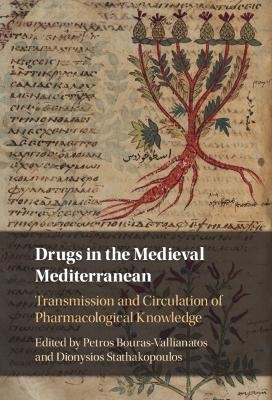
Drugs in the Medieval Mediterranean
Cambridge University Press (Verlag)
978-1-009-38975-4 (ISBN)
In this volume a distinguished international team of scholars examines the history of drugs within all the major medical traditions of the medieval Mediterranean, namely Byzantine, Islamicate, Jewish, and Latin, and in so doing analyses a considerable number of previously unedited or barely explored texts. A Mediterranean-wide perspective permits a deeper understanding of broader phenomena such as the transfer of scientific knowledge and cultural exchange, by looking beyond single linguistic traditions or political boundaries. It also highlights the diversity and vitality of the medieval Mediterranean pharmacological tradition, which, through its close links with cookery, alchemy, magic, religion and philosophy, had to be able to adapt to multiple contexts, not least to changing social and political realities, as in the case of drugs as diplomatic gifts.
PETROS BOURAS-VaLLIANATOS is Associate Professor of History of Science at the National and Kapodistrian University of Athens. He has published widely on Byzantine medicine and pharmacology. His most recent monograph, Innovation in Byzantine Medicine: The Writings of John Zacharias Aktouarios (c.1275–c.1330) (2020) has been awarded the Prize for Young Historians by the International Academy of the History of Science. DIONYSIOS STATHAKOPOULOS is Assistant Professor in Byzantine History at the University of Cyprus. His main research focus is on Byzantine social history. His publications include Famine and Pestilence in the Late Roman and Early Byzantine Empire (2004), The Kindness of Strangers. Charity in the Pre-Modern Mediterranean (2007) and A Short History of the Byzantine Empire (2014, rev. ed. 2023).
Medieval mediterranean pharmacology Petros Bouras-Vallianatos; Part I. Transmission of Pharmacological Knowledge: Texts and Contexts: 1. Ibn al-Tilmīdh's Book on Simple Drugs: a Christian physician from Baghdad on the Arabic, Greek, Syriac, and Persian nomenclature of plants and minerals Fabian Käs; 2. Drugs, provenance, and efficacy in early medieval Latin medical recipes Jeffrey Doolittle; 3. De sexaginta animalibus: AaLatin translation of an Arabic Manāfiʿ al-ḥayawān text on the pharmaceutical properties of animals Kathleen Walker-Meikle; 4. Arabic terms in Byzantine Materia Medica: oral and textual transmission Maria Mavroudi; 5. The theriac of medieval al-Shām Zohar Amar, Yaron Serri, and Efraim Lev; 6. 'Already Verified' – A Hebrew herbal between text and illustration Sivan Gottlieb; Part II. The Borders of Pharmacology: 7. Making magic happen: understanding drugs as therapeutic substances in later Byzantine sorcery and beyond Richard Greenfield; 8. Remedies or superstitions: Maimonides on Mishnah Shabbat 6:10 Phillip I. Lieberman; 9. When the doctor is not around: Arabic-Islamic self-treatment manuals as cultured people's guides to medico-pharmacological knowledge. The Mamluk period (1250–1517) Paulina B. Lewicka; 10. Digestive syrups and after dinner drinks – food or medicine? Leigh Chipman; 11. Late Byzantine alchemical recipe books: metallurgy, pharmacology, and cuisine Matteo Martelli; 12. Making connections between the medical properties of stones and philosophy in the work of Albertus Magnus Athanasios Rinotas; 13. Healing gifts: the role of diplomatic gift exchange in the movement of Materia Medica between the Byzantine and Islamicate worlds Koray Durak.
| Erscheinungsdatum | 24.10.2023 |
|---|---|
| Zusatzinfo | Worked examples or Exercises; 17 Halftones, color |
| Verlagsort | Cambridge |
| Sprache | englisch |
| Gewicht | 828 g |
| Themenwelt | Geschichte ► Allgemeine Geschichte ► Mittelalter |
| Geisteswissenschaften ► Geschichte ► Regional- / Ländergeschichte | |
| Studium ► Querschnittsbereiche ► Geschichte / Ethik der Medizin | |
| ISBN-10 | 1-009-38975-0 / 1009389750 |
| ISBN-13 | 978-1-009-38975-4 / 9781009389754 |
| Zustand | Neuware |
| Informationen gemäß Produktsicherheitsverordnung (GPSR) | |
| Haben Sie eine Frage zum Produkt? |
aus dem Bereich


